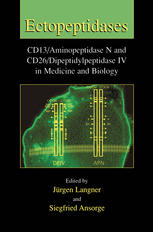

Most ebook files are in PDF format, so you can easily read them using various software such as Foxit Reader or directly on the Google Chrome browser.
Some ebook files are released by publishers in other formats such as .awz, .mobi, .epub, .fb2, etc. You may need to install specific software to read these formats on mobile/PC, such as Calibre.
Please read the tutorial at this link: https://ebookbell.com/faq
We offer FREE conversion to the popular formats you request; however, this may take some time. Therefore, right after payment, please email us, and we will try to provide the service as quickly as possible.
For some exceptional file formats or broken links (if any), please refrain from opening any disputes. Instead, email us first, and we will try to assist within a maximum of 6 hours.
EbookBell Team

4.8
94 reviewsThe idea to compile recent results on the ectoenzymes aminopeptidase N/CD13 and dipeptidylpeptidase IV/CD26 arose from the great interest given by readers world-wide to the two proceedings volumes edited by us in 1997 and 2000 (Ansorge and Langner, 1997; Langner and Ansorge, 2000). These volumes contained the presentations at two symposia held in Magdeburg (Germany) in 1996 and 1999 under the title "Cellular peptidases in immune functions and diseases", which was also the name of the Sonderforschungsbereich in Magdeburg, sponsored by the Deutsche Forschungsgemeinschaft between 1995 and 2001. Our groups in Magdeburg and Halle during the last two decades have provided results on these two enzymes in cells of the hematopoietic system that justify a review in an edited monograph like the present one (see the reviews by Kahne et at. , 1999; Lendeckel et at. ,1999; Riemann et at. , 1999). There are, however, many other groups in Europe, US and Japan which made important contributions to this field and particularly in topics improving the understanding of physiological and pathophysiological roles ofAPN/CD13 and DPIV/CD26. Therefore we decided to invite some of them to contribute reviews of their results to this book. Having worked for about 40 years in the field of proteolysis, for both of us to see the development of activities and knowledge from protein chemistry and enzymology to physiology and pathophysiology and even to therapy is very stimulating and fascinating. Of course, this development also reflects the dramatic improvement and refinement of methods.